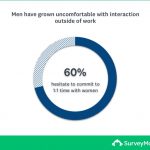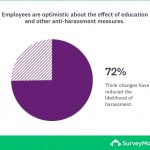For the past few years, there’s been a stream of women coming forward to call out sexual harassment in the workplace. Although powerful and empowering, the #MeToo movement has also had unintended consequences.
Our latest research shows that men—particularly those in senior roles—are pulling back from interacting with women at work, depriving them of the formal and informal mentorship that can aid in networking, securing new opportunities, and promotions. To learn more, we asked over 10,000 workers in the U.S. and U.K. about how their employers address sexual harassment and how safe they feel at work.
Last year, we partnered with LeanIn.Org to research worker’s comfort interacting with other genders in the workplace and create a benchmark for future change. This year, we replicated and expanded the study to see how attitudes might have evolved. The short answer? Men are more hesitant to work one-on-one with women than ever.
Fear of sexual harassment accusations is having real impact on mentorship opportunities
Many men in today’s workplace are afraid of being pegged as a harasser—and they are willing to reduce interaction to avoid the label. A full 40% of male managers in the U.K. and 60% in the U.S. say they are uncomfortable engaging in common workplace interactions with women, including mentoring, socializing, and having one-on-one meetings—that’s up 14 percentage points from last year in the U.S..
Senior men are especially uncomfortable socializing with female colleagues. In 2018, only a third of U.S. male managers (34%) said they were uncomfortable socializing with a woman outside of work (like in a restaurant). In 2019, that number rises to nearly half of male managers (48%). In the U.K. the problem is smaller, but still too large—35% of male managers are uncomfortable socializing with a woman outside of work.
More than a third of male managers in the U.S. (34%) and a quarter (24%) in the U.K. have actively taken steps to avoid having to interact with a female colleague outside of work, and men are also more unwilling to accept 1:1 meetings outside the office.
The impact of this reticence is real. Mentoring often includes dinner or drinks outside of working hours, and if male mentors aren’t willing to do that with ambitious women, those women lose out.

How people see the world in the wake of #MeToo
Workers are seeing sexual harassment as being taken more seriously (68%), and few believe the allegations are categorically false (only 8%)—both positive findings!
Workers are seeing sexual harassment being taken more seriously (68% in the U.S. and 72% in the U.K.), and few believe the allegations are categorically false (only 8% in the U.S. and 5% in the UK)—both positive findings!
However, women feel less safe at work than they did before. In the U.S., only 85% said they feel safe on the job, down from 91% last year. In the U.K., 88% of women feel safe at their workplace. Media coverage that is intended to hold aggressors accountable also seems to create a sense of threat, and people don’t seem to feel like aggressors are held accountable.
Unfortunately, most workers agree that harassers—especially high-performing ones—are inconsistently and insufficiently punished for their actions. Only 16% of workers in the U.S. and 13% in the U.K. think that high-performing harassers are usually held accountable for their actions (and 3 in 10 think they are rarely or never punished). Last year, a third of U.S. workers (35%) said punishments were not harsh enough, but this year that number bumped up to half.
Not only does the public believe that the consequences for harassers aren’t appropriate, many also feel that their victims’ careers are disproportionately impacted. More than half of workers (55% in the U.S. and 63% in the U.K.) believe that the consequences of bringing their story to light are more damaging to victims’ careers than harassers’ careers, and 7 in 10 (69% in the U.S. and 76% in the UK) think the consequences last longer for victims than harassers.
Real solutions are possible, and companies are moving in the right direction

There is some good news, though. #MeToo appears to have spurred companies to greater efforts over the last year. In 2018, only 46% of U.S. workers said their company had done something to address harassment in the workplace—this year 70% of U.S. employees report that their company has taken action in some way, These include:
- Updating sexual harassment policies (36%)
- Providing guidance about appropriate behavior at work (43%)
- Providing guidance on reporting inappropriate action (28%)
- Stopping or removing problematic employees (24%)
In the U.K., only 51% say their workplace has made changes in the last two years to reduce the risk of sexual harassment, but a 24% say their company hasn’t made changes because they have already done enough.
And workers believe these actions to be effective. Among employees whose workplace has taken action in the last two years, 71% of U.S. and 63% of U.K. workers say the changes have reduced the likelihood of sexual harassment. Moreover, 76% of U.S. and 70% of UK workers say they have improved the likelihood that an incident of harassment will be handled appropriately.
Notably, workplaces don’t seem to discourage women and men from interacting with each other. 82% of U.S. and 88% of U.K. workers say their workplace doesn’t discourage people of different genders from mentoring, socializing, or traveling together. Even outside the workplace, 80% of U.S. and 87% of U.K. workers haven’t heard that they should avoid interactions with the opposite gender—meaning most of the hesitance male managers feel is internal.
Sexual harassment is a loaded topic, but limiting interactions between male- and female-identifying employees isn’t the answer. Instead, updated policies, trainings, and guidance about appropriate behavior appear to be the most effective strategies for containing bad actors.
If you aren’t sure how your employees feel, our Diversity and Inclusion surveys can help you instantly assess company culture and make positive changes. All of our D&I surveys are free.
Our Mentorship and advocacy template is quick, simple, and perfect for helping employees get the resources they need to really thrive.
This SurveyMonkey poll was conducted online from February 22 - March 1, 2019 among a total sample of 5,182 full time or part time adults age 18 and over living in the United States. Respondents for these surveys were selected from more than two million people who take surveys on the SurveyMonkey platform each day. The modeled error estimate for the full sample is plus or minus 2.5 percentage points. Data have been weighted for age, race, sex, education, and geography using the Census Bureau’s American Community Survey to reflect the demographic composition of the United States age 18 and over.
A second SurveyMonkey poll was conducted online from April 15 - 26, 2019 among a total sample of 5,951 full time or part time adults age 18 and over living in the United Kingdom. Respondents for these surveys were selected from more than two million people who take surveys on the SurveyMonkey platform each day. The modeled error estimate for the full sample is plus or minus 2 percentage points. Data have been weighted for age, gender, education, and geography using U.K. Census data to reflect the demographic composition of the United Kingdom age 18 and over.
Want to start a mentorship program?
Our Mentorship and advocacy template is quick, simple, and perfect for helping employees get the resources they need to really thrive.
Full Methodology
Two SurveyMonkey online polls were conducted among a national sample of adults in the U.S. ages 18 and older. The first was conducted February 22 - March 1, 2019 among 5,182 adults with a modeled error estimate of +/- 2 percentage points and the second was conducted March 6-10, 2019 among 3,556 adults with a modeled error estimate of +/- 2.5 percentage points. Data for both surveys have been weighted for age, race, sex, education, and geography using the Census Bureau’s American Community Survey to reflect the demographic composition of the United States age eighteen and over.
Lean In|SurveyMonkey
LeanIn.Org|SurveyMonkey
*women *employees *businesses



